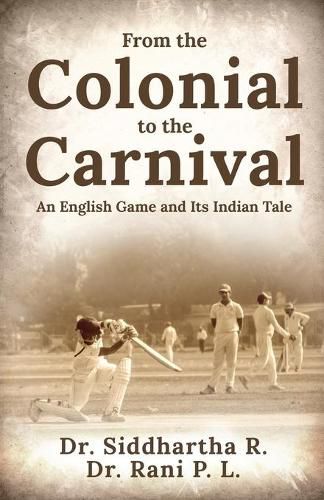Readings Newsletter
Become a Readings Member to make your shopping experience even easier.
Sign in or sign up for free!
You’re not far away from qualifying for FREE standard shipping within Australia
You’ve qualified for FREE standard shipping within Australia
The cart is loading…






Research in colonial studies has traditionally revolved around the historical, political and economic aspects of the colonial regime. The case is no different with the British Empire in India. The Empire was, however, built less by military force and more through cultural reinforcement. To this end, the British engaged many tools - religion, language and sport. Among the three Cs of Victorian England that defined civilisation, Cricket stood on par with Christianity and the Classics. Beyond being a sport, cricket was the Englishman’s representation of his ‘English-ness’ in the colonies and a tool used for colonisation - a scantily researched area. This book traces, through the colonial postulates of Edward Said and Homi K. Bhabha, the colonial path cricket took to its growth in the colony.
The game moved from the ‘exclusivity’ of the English to the ‘mimicry’ of the natives as a part of the informal modes of rule employed in a colonial framework. Once formal modes were employed in the Empire, phases of ‘cultural reinforcement’ by the colonists followed by ‘patronage’ by the natives took over the spread of the game. Historical narratives are filled with examples supporting each phase in the sport. The very same tool that was used to establish the native’s ‘effeminacy’ was used, finally, to invert the hegemony. The book argues how decolonisation, in India’s case, did not occur through ‘rejection’ of the colonial culture, but, paradoxically, through ‘adaptation’ and ‘assimilation’ in clear colonial terms. This discussion achieves recency and relevance through its exposition of the telling decolonising moves in cricket to ‘subvert authority’ through the IPL. Mikhail Bakhtin’s’ theory of the carnival helps view the shift of cricket from the colonial to the carnival mode.
$9.00 standard shipping within Australia
FREE standard shipping within Australia for orders over $100.00
Express & International shipping calculated at checkout
Research in colonial studies has traditionally revolved around the historical, political and economic aspects of the colonial regime. The case is no different with the British Empire in India. The Empire was, however, built less by military force and more through cultural reinforcement. To this end, the British engaged many tools - religion, language and sport. Among the three Cs of Victorian England that defined civilisation, Cricket stood on par with Christianity and the Classics. Beyond being a sport, cricket was the Englishman’s representation of his ‘English-ness’ in the colonies and a tool used for colonisation - a scantily researched area. This book traces, through the colonial postulates of Edward Said and Homi K. Bhabha, the colonial path cricket took to its growth in the colony.
The game moved from the ‘exclusivity’ of the English to the ‘mimicry’ of the natives as a part of the informal modes of rule employed in a colonial framework. Once formal modes were employed in the Empire, phases of ‘cultural reinforcement’ by the colonists followed by ‘patronage’ by the natives took over the spread of the game. Historical narratives are filled with examples supporting each phase in the sport. The very same tool that was used to establish the native’s ‘effeminacy’ was used, finally, to invert the hegemony. The book argues how decolonisation, in India’s case, did not occur through ‘rejection’ of the colonial culture, but, paradoxically, through ‘adaptation’ and ‘assimilation’ in clear colonial terms. This discussion achieves recency and relevance through its exposition of the telling decolonising moves in cricket to ‘subvert authority’ through the IPL. Mikhail Bakhtin’s’ theory of the carnival helps view the shift of cricket from the colonial to the carnival mode.